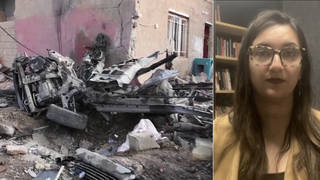
At the United Nations today, chief UN weapons inspector Hans Blix is expected to say their work is just getting started and that more time is needed.
Meanwhile Secretary of State Gen. Colin Powell indicated yesterday that it would be useless to give the inspectors more time. Powell made these comments at the World Economic Forum in Davos, Switzerland. Powell went on to say the U.S. would be willing to wage war against Iraq alone if European nations would not fight. Powell said Washington had a “sovereign right to take military action on Iraq alone or in a coalition of the willing.” He also claimed Iraqi President Saddam Hussein had ties to Al Qaeda but offered no evidence.
Both the United States and key ally Britain could use Monday’s report to press for military action against Iraq on the grounds of Baghdad failing to cooperate with the inspectors in line with UN disarmament Resolution 1441.
In other Iraq news, CBS News is reporting that the U.S. is considering waging an unprecedented bombing campaign against Iraq in the opening days of war if the Bush Administration chooses military action against Iraq.
The military plans to drop between 300 and 400 cruises missiles in the first 24 hours of attack, easily exceeding the total fired over six weeks in the 1991 Gulf war.
The aim is to cause such “shock and awe” that Iraqi troops will lose their will to fight at the outset. Just in case they do not get the message immediately, the US plans do the same again on day two.
And the Los Angeles Times is reporting that Pentagon is quietly preparing for the possible use of nuclear weapons in a war against Iraq.
The military planners have been studying lists of potential targets and considering options, including the possible use of so-called bunker-buster nuclear weapons against deeply buried military targets.
Guests:
- Phyllis Bennis, fellow at the Institute for Policy Studies in Washington DC, specializing in Middle East and United Nations issues She is the author of the book ??Before and After: U.S. Foreign Policy and the September 11th Crisis.
- Andreas Zumach, Geneva-based UN correspondent with the German newspaper Die Tageszeitung. Last month Zumach obtained an unedited copy of Iraq’s 12,000-page report to the United Nations, including portions on how Iraq acquired its weapon capability from Germany, the U.S. and others.
Related link:











Media Options